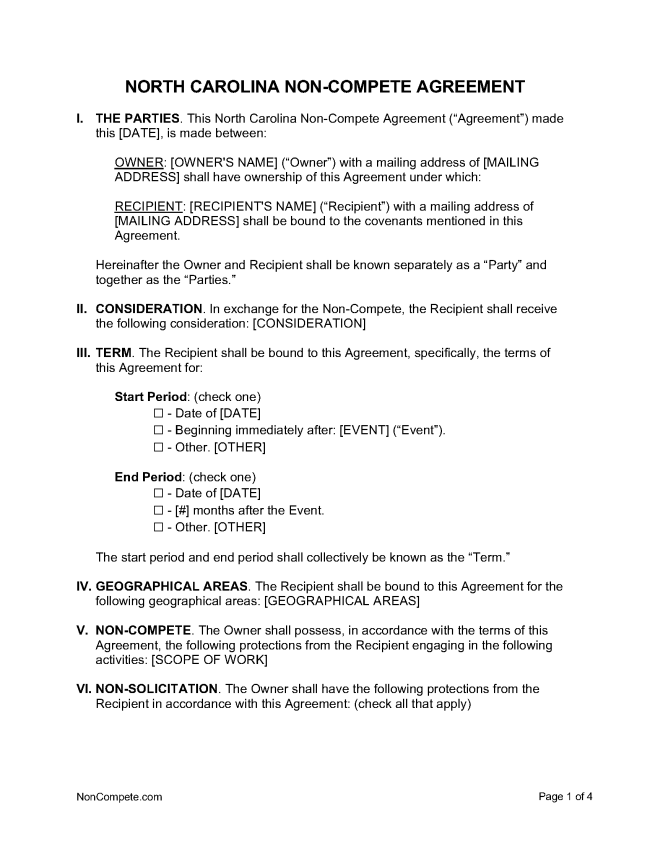A North Carolina non-compete agreement is a set of terms in a contract that limits the ability of someone to pursue a particular trade or line of business. North Carolina’s laws have much in common with other states, but some issues are analyzed differently.
For example, the idea of a legitimate business interest, which is usually required for a non-compete to be enforceable, comes up in North Carolina law but is generally analyzed as a part of other considerations rather than on its own.
Table of Contents |
Are Non-Competes Enforceable in North Carolina?
Yes, so long as they are:
- In writing (N.C. Gen. Stat. Ann. § 75-4);
- Part of an employment contract
- Based on valuable consideration
- Reasonable as to time and territory; and
- Not against public policy.
United Laboratories, Inc. v. Kuykendall (1993).
Legitimate Business Interest
Although not always mentioned as one of the required factors for finding an agreement enforceable, North Carolina courts require that non-compete agreements protect a legitimate business interest, incorporating them into other factors. Interests that may be protected through non-compete agreements include:
- Customer relationships, including the possibility of the departing employee misappropriating customers
- Valuable, confidential information related to the nature and character of the business.
A.E.P. Industries, Inc. v. McClure (1983)
Sale of Business vs. Employment Contract
Unlike many other states, North Carolina cases have not necessarily stated that non-compete agreements associated with the sale of a business are scrutinized less strictly than those contained in employment contracts. In Kennedy v. Kennedy (2003), the North Carolina Court of Appeals identified an essentially similar statement that all non-compete agreements are “strictly scrutinized.”
Nonetheless, the meaning of a “reasonable” restriction appears to be more generous for a non-compete associated with the sale of a business than one found in an employment contract. See the “Maximum Term” section for more.
Independent Contractors
Non-compete agreements in North Carolina can be enforced against independent contractors. (Superior Performers, Inc. v. Phelps (2016)).
Territorial Restriction
When the primary business interest is the former employee’s knowledge of customers, the territory should be limited to the area or areas in which the employee made contacts during the period of employment.
Hartman v. W.H. Odell and Associates, Inc. (1994).
The territory covered by a non-compete agreement cannot be any larger than is necessary to protect the legitimate business interest. (Triangle Leasing Co., Inc. v. McMahon (1990)).
Prohibited Professions
A non-compete agreement involving physicians is against public policy and therefore unenforceable if enforcing it would create a significant possibility of harm to public health. However, such an agreement will be enforced if it only inconveniences the public without causing substantial harm. (Iredell Digestive Disease Clinic, P.A. v. Petrozza (1988)).
Attorneys may not enter agreements restraining their right to practice or represent clients when contained in:
- Employment contracts, partnership agreements, or similar instruments, except for agreements concerning retirement benefits. Rule 5.6(a), North Carolina Rules of Professional Conduct.
- Case settlements. Rule 5.6(b), North Carolina Rules of Professional Conduct.
Terminating an Employee
If an employee has been terminated, the circumstances of the employee’s termination are one factor in determining whether a non-compete agreement should be enforced against the employee. In Masterclean of North Carolina, Inc. v. Guy (1986), the fact that the employer terminated the employee, rather than the employee quitting, was one factor in the Court of Appeals of North Carolina’s decision not to enforce the non-compete agreement.
The party seeking to enforce a non-compete agreement has the burden of proving that the agreement is reasonable. (Hartman v. W.H. Odell and Associates, Inc. (1994)).
Continued Employment (consideration)
Keeping an at-will position an employee already has is insufficient consideration to support a non-compete agreement. (Cox v. Dine-a-Mate, Inc. (1998)).
Maximum Term
There is no maximum term, either in statute or in cases, for non-compete agreements in North Carolina because the reasonableness of restraint will depend on other factors, including the area covered. Courts look at each case individually, although a smaller area covered may allow for an agreement that lasts longer and vice versa. In non-compete agreements involving employment contracts, five years is generally the longest time courts have permitted, and even that length is unusual. (Farr Associates, Inc. v. Baskin (2000)).
In non-competes associated with the sale of a business, longer terms have been enforced, and on multiple occasions, courts have approved restrictions covering 15 years. Kennedy v. Kennedy (2003))
Blue Penciling
Courts in North Carolina take an intermediate approach to “blue penciling” or modifying non-compete agreements. If a contract is too broad, courts will decline to enforce it rather than rewrite it; a geographic restriction that is too large, for example, will not be rewritten to make it smaller. But if an unreasonable provision can be separated, courts will enforce the reasonable portion. (Whittaker General Medical Corp. v. Daniel (1989)).
